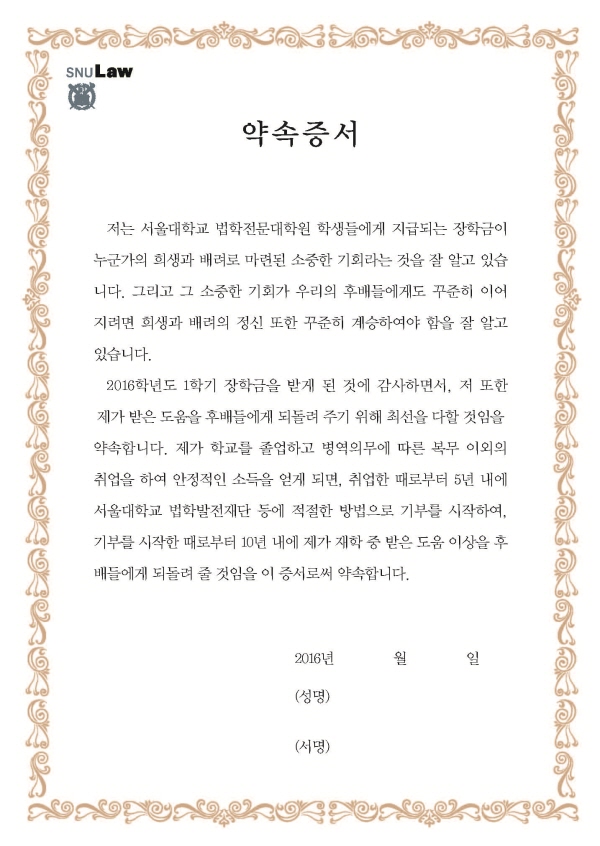
Scholarship recipients should sign this Letter of Promise when they receive the grant.
SNU’s renowned School of Law revealed on 27th March its plans to introduce the ‘Promise Scholarship’, adopted from the Bucerius Law School in Germany. Recipients of this scholarship must “promise” to give back more than the amount they received from the scholarship, in order to help their juniors. This donation must begin within five years of receiving a stable income and continue for ten years.
In addition to this, the School of Law buttressed their current scholarships this semester, such as providing full-tuition scholarships for students from families in the bottom 50% income group.
LEE Won Woo, the dean of the School of Law, affirmed the significance of the ‘Promise Scholarship,’ saying that, “though the agreement is nonbinding, it provokes a moral responsibility in the students to share and return what they had received. Furthermore, the cyclical structure of the ‘Promise Scholarship’ will allow a more stable source of financial support to fund future scholarships.
Since this restructuring of scholarships, 132 (28.3%) of the 466 students in the School of Law received tuition scholarships, ranging from 20 to 100% financial support, the exact amount being contingent on the students’ economic backgrounds.
In addition to tuition scholarships, stipends for living expenses were also introduced. This semester, 61 students received this scholarship, which provides from 300,000 to 500,000 KRW monthly.
However, there have been remarks that this system is not a fundamental solution to reducing law schools’ remarkably high tuition fees. The annual tuition for private law schools usually exceeds 20,000,000 KRW. Last year, SNU School of Law’s annual tuition was 13,392,000 KRW. This overwhelmingly high tuition of Law school has sparked/initiated a controversy; detractors describe it as the ‘career caste system’ wherein only those born into well-heeled families have access to the elite societal ranks. An official of the Ministry of Education claimed that “SNU rejected the policy recommended by the Ministry of Education to reduce the tuition by 15%, and simply restructured the current low-income bracket scholarship.”
Still, the ‘Promise Scholarship’ is meaningful in that it encourages students to continue their studies diligently with the moral imperative of returning the help they received to future generations of Law students.
Written by Hye Bin Lee, SNU English Editor, hahahybes@snu.ac.kr
Reviewed by Professor Travis Smith, Department of Asian Languages and Civilizations, tlsmith@snu.ac.kr

